All products and services are For Research Use Only and CANNOT be used in the treatment or diagnosis of disease.
Our team of experts is dedicated to providing cutting-edge technical assistance and guidance to help researchers overcome any challenges they may encounter during the CAR-T therapy development process. Our anti-GD3 CAR-related products are designed to assist researchers in the development of CAR-T therapies.
GD3 is one of Ganglioside molecules. A ganglioside is a molecule composed of a glycosphingolipid (ceramide and oligosaccharide) with one or more sialic acids (e.g. n-acetylneuraminic acid, NANA) linked on the sugar chain. GD3 contains 2 NANA residues. It is known to be important for cell adhesion and growth of cultured malignant cells. GD3 is known to be overexpressed in several types of cancer, including melanoma, neuroblastoma, and small-cell lung cancer. Targeting GD3 with specific antibodies or specific cell therapy can selectively kill cancer cells while sparing healthy cells, making it a promising strategy for cancer therapy.
T-cell lymphoblastic leukemia
Anti-GD3 CAR-T Expression Test
Our CAR expression test involves analyzing anti-GD3 CAR expression by various detection methods, including flow cytometry, western blot, and qPCR. These techniques allow researchers to monitor the expression of CAR molecules, enabling them to optimize CAR constructs.
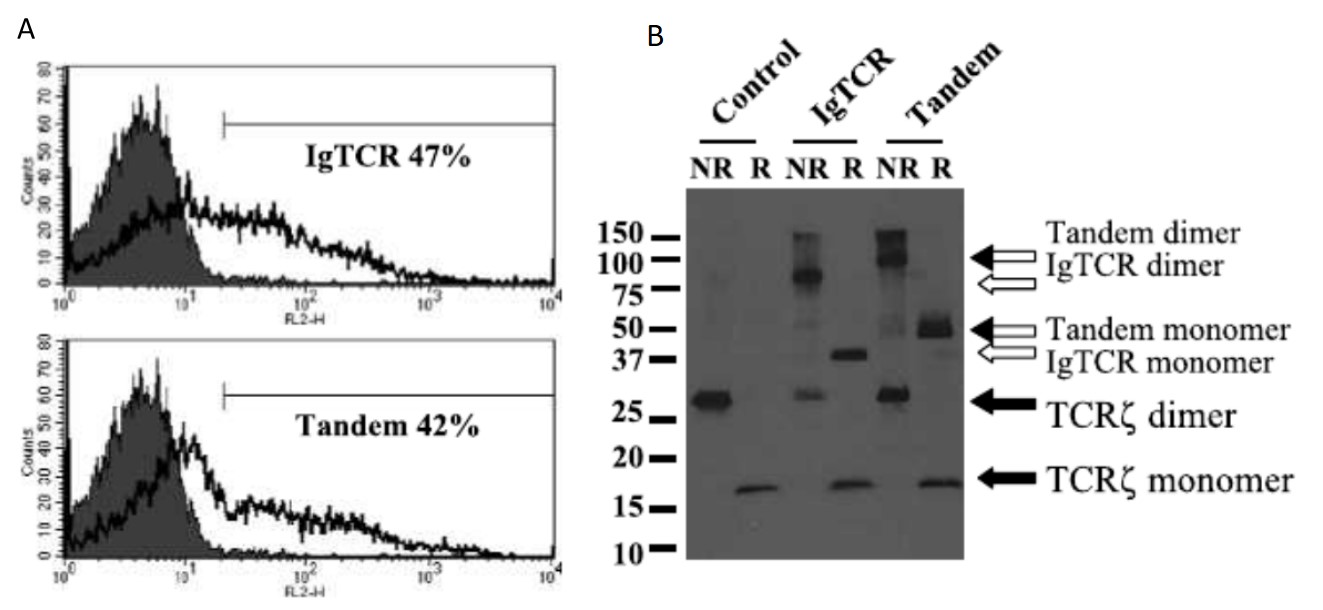 Fig.1 Analysis of GD3-specific CARs. (A) Flow cytometry analysis of cell-surface expression of anti-GD3-CAR on transduced T cells. (B) Western blot analysis of sizes of CARs.1
Fig.1 Analysis of GD3-specific CARs. (A) Flow cytometry analysis of cell-surface expression of anti-GD3-CAR on transduced T cells. (B) Western blot analysis of sizes of CARs.1
Anti-GD3 CAR-T Proliferation Test
The anti-GD3 CAR-T Proliferation Test is designed to assess the proliferative response of CAR-T cells against GD3, a common target antigen on the surface of many cancer cells. We provide various CAR-T cell proliferation assays. One common technique for measuring CAR-T cell proliferation is the use of flow cytometry.
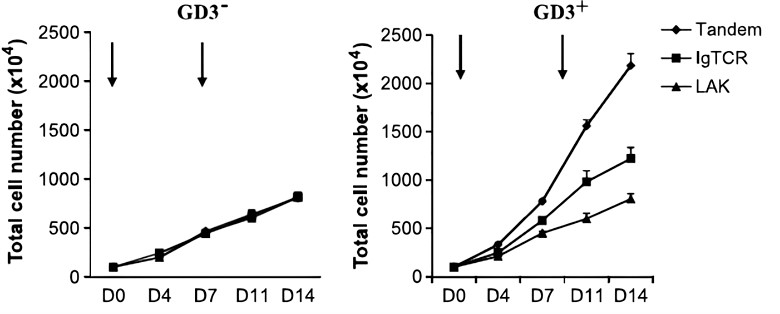 Fig.2 The proliferation of anti-GD3 CAR-T cells with GD3 positive or negative tumor stimulation.1
Fig.2 The proliferation of anti-GD3 CAR-T cells with GD3 positive or negative tumor stimulation.1
Anti-GD3 CAR-T Cytokine Release Test
The Anti-GD3 CAR-T cytokine release test is a valuable tool for evaluating the immune-stimulating potential of anti-GD3 CAR-T cells. By measuring cytokine release levels, researchers can identify the most suitable and safe CAR-T cells for therapeutic applications.
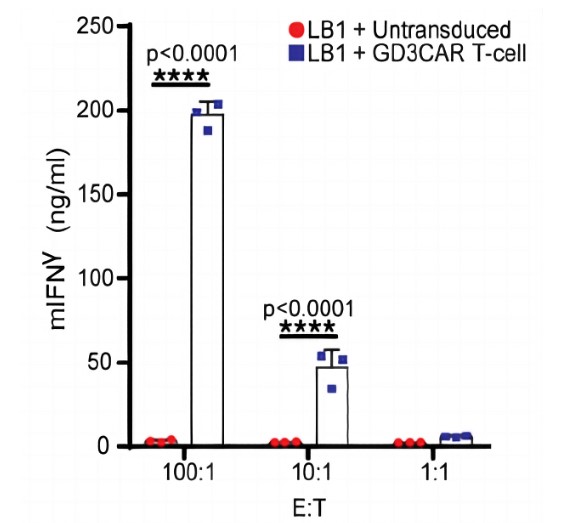 Fig.3 IFN-γ release by anti-GD3 CAR T cells with LB1 Tsc2–/– tumor cells.2
Fig.3 IFN-γ release by anti-GD3 CAR T cells with LB1 Tsc2–/– tumor cells.2
Anti-GD3 CAR-T In Vitro Cytotoxicity Assay
Our team of experts has experience in CAR-T cytotoxicity assays that are used to evaluate the ability of GD3 CAR-T cells to kill specific target cells.
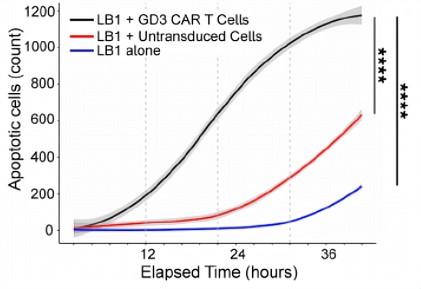 Fig.4 The cytotoxicity of anti-GD3 CAR-T against LB1 tumor cells. The anti-GD3 CAR-T cells significantly increased apoptosis of LB1 cells.2
Fig.4 The cytotoxicity of anti-GD3 CAR-T against LB1 tumor cells. The anti-GD3 CAR-T cells significantly increased apoptosis of LB1 cells.2
Efficacy Test of Anti-GD3 CAR-T
In vivo efficacy tests of GD3 CAR-T cells are essential for assessing the therapeutic potential and safety of these cells in a living organism. By monitoring tumor growth and assessing survival rates, we can determine the effectiveness of anti-GD3 CAR-T cells in inhibiting tumor progression.
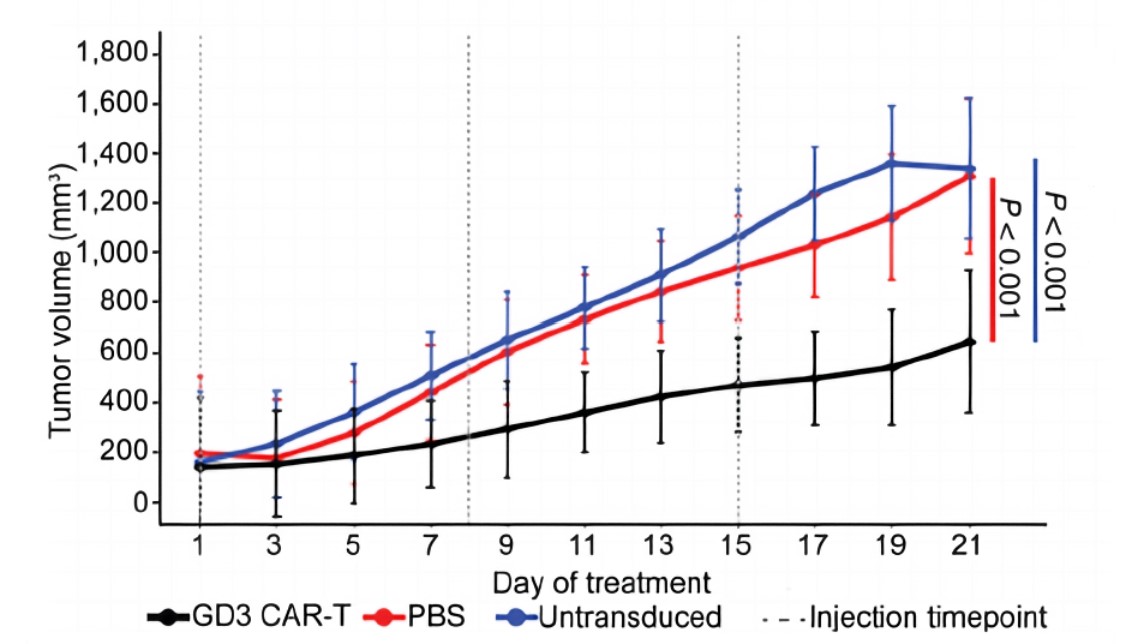 Fig.5 Tumor volumes in the treatment groups over time. The results showed that GD3. The anti-GD3 CAR-T cells specifically inhibit tumor growth.2
Fig.5 Tumor volumes in the treatment groups over time. The results showed that GD3. The anti-GD3 CAR-T cells specifically inhibit tumor growth.2
Toxicity Evaluation Anti-GD3 CAR-T
At Creative Biolabs, our comprehensive suite of CAR T cell therapy toxicology study services ensures that the therapeutic efficacy, safety, and potential side effects of anti-GD3 CAR T cell therapy are thoroughly evaluated.
References
 Loading...
Loading...
| CAT | Product Name | Target Species | Antibody Clone | Antibody Host | Receptor Construction | Vector Type | Targeting Cell Type | CAR Vector Type | Inquiry & Datasheet |
| CAR-T-1-M317-2 | Anti-GD3 scFv h(CD28) CART, pCDCAR1 | Human | MB3.6 | Mouse | scFv-CD28 | Lentiviral | T cell | ||
| CAR-T-1-M317-G | Anti-GD3 scFv h(FcεRIγ) CART, pCDCAR1 | Human | MB3.6 | Mouse | scFv-FcεRIγ | Lentiviral | T cell | ||
| CAR-T-1-M317-Z | Anti-GD3 scFv h(CD3ζ) CART, pCDCAR1 | Human | MB3.6 | Mouse | scFv-CD3ζ | Lentiviral | T cell | ||
| CAR-T-2-M317-2G | Anti-GD3 scFv h(CD28-FcεRIγ) CART, pCDCAR1 | Human | MB3.6 | Mouse | scFv-CD28-FcεRIγ | Lentiviral | T cell | ||
| CAR-T-2-M317-2Z | Anti-GD3 scFv h(CD28-CD3ζ) CART, pCDCAR1 | Human | MB3.6 | Mouse | scFv-CD28-CD3ζ | Lentiviral | T cell | ||
| XS-0323-LX3873 | TRAC-GD3 (X3XT75) h(CD28-41BB-CD3ζ) replaced CAR, pcDNA Vector | Human | X3XT75 | Mouse | Homology arm-EF1a-scFv-CD28-41BB-CD3ζ-Homology arm | Nonviral | T cell | CAR-T | |
| XS-0323-LX3874 | TRAC-GD3 (X3XT76) h(CD28-41BB-CD3ζ) replaced CAR, pcDNA Vector | Human | X3XT76 | Mouse | Homology arm-EF1a-scFv-CD28-41BB-CD3ζ-Homology arm | Nonviral | T cell | CAR-T | |
| XS-0323-LX3875 | TRAC-GD3 (X3XT77) h(CD28-41BB-CD3ζ) replaced CAR, pcDNA Vector | Human | X3XT77 | Mouse | Homology arm-EF1a-scFv-CD28-41BB-CD3ζ-Homology arm | Nonviral | T cell | CAR-T | |
| XS-0323-LX3876 | TRAC-GD3 (X3XT78) h(CD28-41BB-CD3ζ) replaced CAR, pcDNA Vector | Human | X3XT78 | Mouse | Homology arm-EF1a-scFv-CD28-41BB-CD3ζ-Homology arm | Nonviral | T cell | CAR-T | |
| XS-0323-LX3877 | TRAC-GD3 (X3XT79) h(CD28-41BB-CD3ζ) replaced CAR, pcDNA Vector | Human | X3XT79 | Mouse | Homology arm-EF1a-scFv-CD28-41BB-CD3ζ-Homology arm | Nonviral | T cell | CAR-T | |
| XS-0323-LX4115 | TRAC-GD3 (X3XT75) h(CD28-OX40-CD3ζ) replaced CAR, pcDNA Vector | Human | X3XT75 | Mouse | Homology arm-EF1a-scFv-CD28-OX40-CD3ζ-Homology arm | Nonviral | T cell | CAR-T | |
| XS-0323-LX4116 | TRAC-GD3 (X3XT76) h(CD28-OX40-CD3ζ) replaced CAR, pcDNA Vector | Human | X3XT76 | Mouse | Homology arm-EF1a-scFv-CD28-OX40-CD3ζ-Homology arm | Nonviral | T cell | CAR-T | |
| XS-0323-LX4117 | TRAC-GD3 (X3XT77) h(CD28-OX40-CD3ζ) replaced CAR, pcDNA Vector | Human | X3XT77 | Mouse | Homology arm-EF1a-scFv-CD28-OX40-CD3ζ-Homology arm | Nonviral | T cell | CAR-T | |
| XS-0323-LX4118 | TRAC-GD3 (X3XT78) h(CD28-OX40-CD3ζ) replaced CAR, pcDNA Vector | Human | X3XT78 | Mouse | Homology arm-EF1a-scFv-CD28-OX40-CD3ζ-Homology arm | Nonviral | T cell | CAR-T | |
| XS-0323-LX4119 | TRAC-GD3 (X3XT79) h(CD28-OX40-CD3ζ) replaced CAR, pcDNA Vector | Human | X3XT79 | Mouse | Homology arm-EF1a-scFv-CD28-OX40-CD3ζ-Homology arm | Nonviral | T cell | CAR-T | |
| XS-0323-LX4357 | TRAC-GD3 (X3XT75) h(ICOS-4-1BB-CD3ζ) replaced CAR, pcDNA Vector | Human | X3XT75 | Mouse | Homology arm-EF1a-scFv-ICOS-41BB-CD3ζ-Homology arm | Nonviral | T cell | CAR-T | |
| XS-0323-LX4358 | TRAC-GD3 (X3XT76) h(ICOS-4-1BB-CD3ζ) replaced CAR, pcDNA Vector | Human | X3XT76 | Mouse | Homology arm-EF1a-scFv-ICOS-41BB-CD3ζ-Homology arm | Nonviral | T cell | CAR-T | |
| XS-0323-LX4359 | TRAC-GD3 (X3XT77) h(ICOS-4-1BB-CD3ζ) replaced CAR, pcDNA Vector | Human | X3XT77 | Mouse | Homology arm-EF1a-scFv-ICOS-41BB-CD3ζ-Homology arm | Nonviral | T cell | CAR-T | |
| XS-0323-LX4360 | TRAC-GD3 (X3XT78) h(ICOS-4-1BB-CD3ζ) replaced CAR, pcDNA Vector | Human | X3XT78 | Mouse | Homology arm-EF1a-scFv-ICOS-41BB-CD3ζ-Homology arm | Nonviral | T cell | CAR-T | |
| XS-0323-LX4361 | TRAC-GD3 (X3XT79) h(ICOS-4-1BB-CD3ζ) replaced CAR, pcDNA Vector | Human | X3XT79 | Mouse | Homology arm-EF1a-scFv-ICOS-41BB-CD3ζ-Homology arm | Nonviral | T cell | CAR-T | |
| XS-0823-LX52 | Anti-hGD3 (M641) ICD(CD28-OX40-CD3ζ) CAR-MA, pAd5f35 Vector | Human | M641 | Adenoviral vectors |
 NEWSLETTER
NEWSLETTER
The latest newsletter to introduce the latest breaking information, our site updates, field and other scientific news, important events, and insights from industry leaders
LEARN MORE NEWSLETTER NEW SOLUTION
NEW SOLUTION
CellRapeutics™ In Vivo Cell Engineering: One-stop in vivo T/B/NK cell and macrophage engineering services covering vectors construction to function verification.
LEARN MORE SOLUTION NOVEL TECHNOLOGY
NOVEL TECHNOLOGY
Silence™ CAR-T Cell: A novel platform to enhance CAR-T cell immunotherapy by combining RNAi technology to suppress genes that may impede CAR functionality.
LEARN MORE NOVEL TECHNOLOGY NEW SOLUTION
NEW SOLUTION
Canine CAR-T Therapy Development: From early target discovery, CAR design and construction, cell culture, and transfection, to in vitro and in vivo function validation.
LEARN MORE SOLUTION